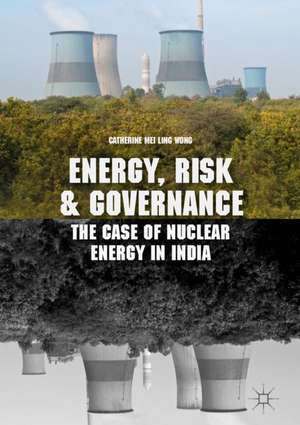Energy, Risk and Governance: The Case of Nuclear Energy in India
Autor Catherine Mei Ling Wongen Limba Engleză Hardback – 12 ian 2018
Energy, Risk and Governance presents a nuanced picture of why nuclear energy is still considered by some as a rational choice. This is in spite of its risks, the ambiguities in both expert and public risk perceptions, and the internal reflexivities that have emerged within the nuclear establishment as a result of the Fukushima-Daiichi disaster that is absent from public discourse. The insights in this book are not unique to India and similar observations can likely be made across the global nuclear industry.
Reflecting on what this means for risk governance in practice, this book proposes practical suggestions and some tools that practitioners in the nuclear industry can use in public engagement, risk communication and deliberation at various stages of decision-making.
| Toate formatele și edițiile | Preț | Express |
|---|---|---|
| Paperback (1) | 689.42 lei 6-8 săpt. | |
| Springer International Publishing – 4 iun 2019 | 689.42 lei 6-8 săpt. | |
| Hardback (1) | 699.42 lei 6-8 săpt. | |
| Springer International Publishing – 12 ian 2018 | 699.42 lei 6-8 săpt. |
Preț: 699.42 lei
Preț vechi: 822.84 lei
-15% Nou
Puncte Express: 1049
Preț estimativ în valută:
133.83€ • 139.73$ • 110.76£
133.83€ • 139.73$ • 110.76£
Carte tipărită la comandă
Livrare economică 04-18 aprilie
Preluare comenzi: 021 569.72.76
Specificații
ISBN-13: 9783319633626
ISBN-10: 3319633627
Pagini: 286
Ilustrații: XVII, 286 p. 10 illus.
Dimensiuni: 148 x 210 mm
Greutate: 0.64 kg
Ediția:1st ed. 2018
Editura: Springer International Publishing
Colecția Palgrave Macmillan
Locul publicării:Cham, Switzerland
ISBN-10: 3319633627
Pagini: 286
Ilustrații: XVII, 286 p. 10 illus.
Dimensiuni: 148 x 210 mm
Greutate: 0.64 kg
Ediția:1st ed. 2018
Editura: Springer International Publishing
Colecția Palgrave Macmillan
Locul publicării:Cham, Switzerland
Cuprins
1. Nuclear Energy, Risk and Governance.- 2. Risk in Social Theory.- 3. The Making of India’s Nuclear Energy Programme.- 4. Elite Risk Perceptions.- 5. Risk and Safety.- 6. Public Risk Perceptions.- 7. From Risk Management to Risk Governance.- 8. Conclusion.
Notă biografică
Catherine Mei Ling Wong is a sociologist at the University of Luxembourg. Her research focuses on risk governance in the energy sector, climate policy, and global financial centres. She also specialises in qualitative comparative research methods. She has held various research and teaching positions at James Cook University, the Australian National University and the Singapore Institute of Management University (UniSIM).
Textul de pe ultima copertă
This book is about how energy, risk and governance are intertwined in the development of the nuclear industry in India and its relationship with the Indian public. It provides a rare insider-view of how the nuclear establishment thinks about risk, contrasted with public understandings of nuclear risk.
Energy, Risk and Governance presents a nuanced picture of why nuclear energy is still considered by some as a rational choice. This is in spite of its risks, the ambiguities in both expert and public risk perceptions, and the internal reflexivities that have emerged within the nuclear establishment as a result of the Fukushima-Daiichi disaster that is absent from public discourse. The insights in this book are not unique to India and similar observations can likely be made across the global nuclear industry.
Reflecting on what this means for risk governance in practice, this book proposes practical suggestions and some tools that practitioners in the nuclear industry can use in public engagement, risk communication and deliberation at various stages of decision-making.
Energy, Risk and Governance presents a nuanced picture of why nuclear energy is still considered by some as a rational choice. This is in spite of its risks, the ambiguities in both expert and public risk perceptions, and the internal reflexivities that have emerged within the nuclear establishment as a result of the Fukushima-Daiichi disaster that is absent from public discourse. The insights in this book are not unique to India and similar observations can likely be made across the global nuclear industry.
Reflecting on what this means for risk governance in practice, this book proposes practical suggestions and some tools that practitioners in the nuclear industry can use in public engagement, risk communication and deliberation at various stages of decision-making.
Caracteristici
Provides a nuanced picture of why nuclear power in India can be considered a rational choice in spite of the risks Exposes the ambiguities in both expert and public risk perceptions of nuclear energy Presents an insider view of how the nuclear elite think about risk
